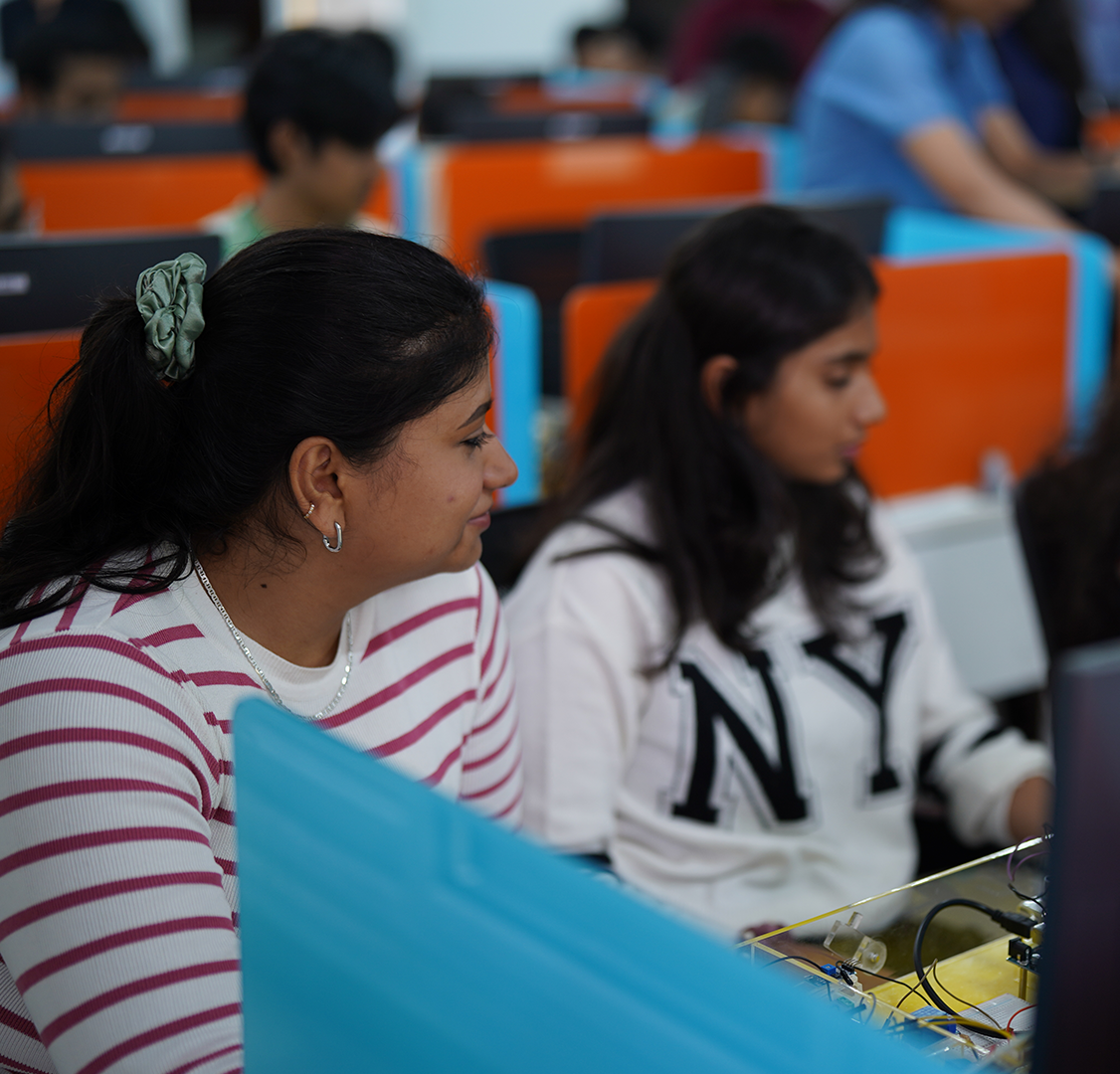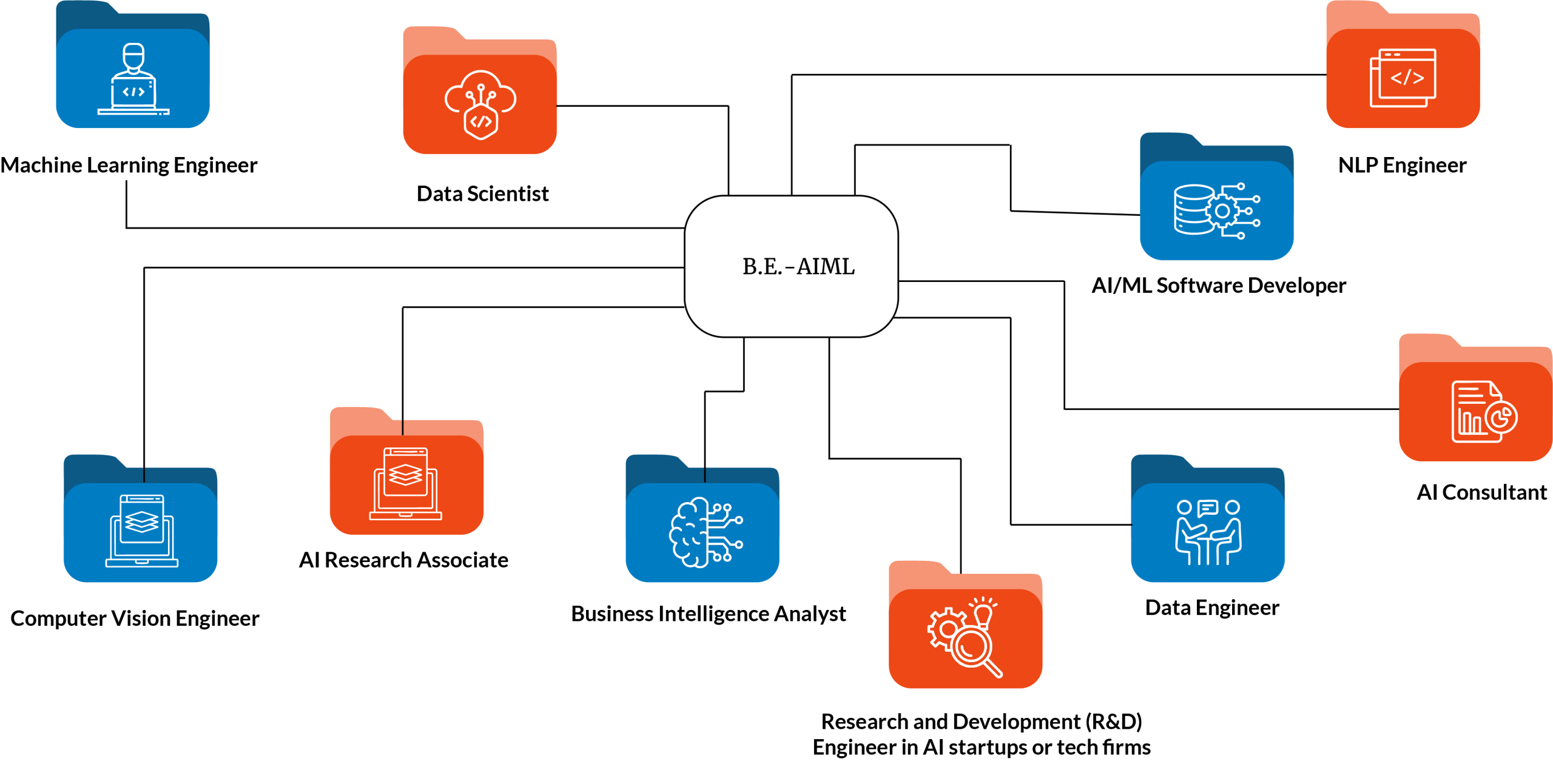B.E. In Artificial Intelligence and Machine Learning
120
4 Years
![]() NBA
NBA
ABOUT THE
PROGRAMME
The Department of Artificial Intelligence and Machine Learning at RV College of Engineering, established in 2021, began with an initial intake of 60 students. Recognizing the growing demand and interest in the field, the intake capacity was increased to 120 students starting in 2023.
The program is meticulously designed to lay a robust foundation in Computer Science Engineering, while offering specialized expertise in cutting-edge areas such as Artificial Intelligence, Machine Learning, Deep Learning, Reinforcement Learning, Natural Language Processing (NLP), Human-Computer Interaction (HCI), Data Science, Metaheuristics, Computer Vision, Business Intelligence, and diverse interdisciplinary domains.
In alignment with emerging industry trends and academic advancements, the discipline has been rebranded as Computer Science Engineering (Artificial Intelligence and Machine Learning) from the academic year 2024, reflecting its comprehensive and future-focused curriculum.
The B.E. programme in Artificial Intelligence and Machine Learning is where innovation meets intelligence. From building smart systems to solving real-world challenges, students dive into AI, ML, Deep Learning, NLP, Computer Vision and more. With a project-based curriculum, hands-on training and strong industry connections, the programme equips future engineers to lead in a tech-driven world—creative, confident and ready for what’s next.

Vision
To develop sustainable solutions for the greater good of society through quality engineering education in Artificial Intelligence and Machine Learning with innovation, research and consultancy activities.

Mission
- To impart cutting-edge knowledge and skills in Artificial Intelligence and Machine Learning with a foundation in Computer Science and Engineering.
- To promote innovative research and development in Artificial Intelligence, Machine Learning and its allied fields in collaboration with industries.
- To prepare students to solve real-world problems by imparting engineering skills through experiential learning.
- To provide a pleasant environment in pursuit of excellence by upholding high personal and professional values and ethics.

Vision
To develop sustainable solutions for the greater good of society through quality engineering education in Artificial Intelligence and Machine Learning with innovation, research and consultancy activities.

Mission
- To impart cutting-edge knowledge and skills in Artificial Intelligence and Machine Learning with a foundation in Computer Science and Engineering.
- To promote innovative research and development in Artificial Intelligence, Machine Learning and its allied fields in collaboration with industries.
- To prepare students to solve real-world problems by imparting engineering skills through experiential learning.
- To provide a pleasant environment in pursuit of excellence by upholding high personal and professional values and ethics.
Placement overview
Companies Visited
Offers Made
Students Selected
Salary
Salary
Top Recruiters & Industry Collaboration






MORE ABOUT THE DEPARTMENT
Programme Outcomes (PO)
Knowledge and Attitude Profile (WK)
Programme Educational Objectives (PEOs)
- To develop graduates capable of applying principles of mathematics, science and computer science engineering, along with Artificial Intelligence and Machine Learning knowledge to solve real-world interdisciplinary problems.
- To enable graduates to analyse and understand state-of-the-art technologies and industrial practices in Artificial Intelligence and Machine Learning through experiential learning.
- To develop graduates who demonstrate cultural awareness, teamwork and professional ethics with strong communication skills and an understanding of the social and economic impact of Artificial Intelligence and Machine Learning.
- To prepare employable graduates for appropriate industry roles or entrepreneurship, to cultivate students who achieve high career goals and/or pursue lifelong learning through further education.


Programme Educational Objectives (PEOs)
- To develop graduates capable of applying principles of mathematics, science and computer science engineering, along with Artificial Intelligence and Machine Learning knowledge to solve real-world interdisciplinary problems.
- To enable graduates to analyse and understand state-of-the-art technologies and industrial practices in Artificial Intelligence and Machine Learning through experiential learning.
- To develop graduates who demonstrate cultural awareness, teamwork and professional ethics with strong communication skills and an understanding of the social and economic impact of Artificial Intelligence and Machine Learning.
- To prepare employable graduates for appropriate industry roles or entrepreneurship, to cultivate students who achieve high career goals and/or pursue lifelong learning through further education.

Programme Specific Outcomes (PSO)
1. Problem Solving and Analysis
The student will be able to:
- Appreciate the importance of mathematics, electronics and sensors, data organisation and algorithms, design thinking and software engineering principles in building intelligent computational systems.
- Understand the applicability of Artificial Intelligence and Machine Learning algorithms to solve real-world problems.
- Identify the need for Deep Learning, Computer Vision and Natural Language Processing to develop intelligent software products with a focus on application performance.
- Demonstrate teamwork, effective communication, project management and documentation skills.
2. Experiential Learning
The student will be able to:
- Demonstrate the application of knowledge to develop intelligent software programmes for use case scenarios in industrial sectors such as healthcare, agriculture, education and up-skilling, governance, energy, automotive, infrastructure, banking, finance and manufacturing.
- Participate in planning and developing enterprise-level solutions using cutting-edge technologies while displaying group dynamics and professional ethics.
- Employ experiential learning throughout the programme to enhance practical understanding and achieve state-of-the-art competence in the domain.

Programme Specific Outcomes (PSO)
1. Problem Solving and Analysis
The student will be able to:
- Appreciate the importance of mathematics, electronics and sensors, data organisation and algorithms, design thinking and software engineering principles in building intelligent computational systems.
- Understand the applicability of Artificial Intelligence and Machine Learning algorithms to solve real-world problems.
- Identify the need for Deep Learning, Computer Vision and Natural Language Processing to develop intelligent software products with a focus on application performance.
- Demonstrate teamwork, effective communication, project management and documentation skills.
2. Experiential Learning
The student will be able to:
- Demonstrate the application of knowledge to develop intelligent software programmes for use case scenarios in industrial sectors such as healthcare, agriculture, education and up-skilling, governance, energy, automotive, infrastructure, banking, finance and manufacturing.
- Participate in planning and developing enterprise-level solutions using cutting-edge technologies while displaying group dynamics and professional ethics.
- Employ experiential learning throughout the programme to enhance practical understanding and achieve state-of-the-art competence in the domain.
Scheme and Syllabus
First Year
Second Year
Third Year
Fourth Year
Scheme and Syllabus
First Year
Fourth Year
B.E.- AI-ML Curriculum Structure (160 Credits)
Curriculum Component
Curriculum Content (% of total number of credits of the program)
Total Number of Contact hours
Total Number of Credits
Basic Sciences
Xxxxx Xxxxxx
Xxxxx Xxxxxx
Xxxxx Xxxxxx
Basic Engineering
Xxxxx Xxxxxx
Xxxxx Xxxxxx
Xxxxx Xxxxxx
Humanities & Social Science
Xxxxx Xxxxxx
Xxxxx Xxxxxx
Xxxxx Xxxxxx
Program Core
Xxxxx Xxxxxx
Xxxxx Xxxxxx
Xxxxx Xxxxxx
Program Electives
Xxxxx Xxxxxx
Xxxxx Xxxxxx
Xxxxx Xxxxxx
Open Electives
Xxxxx Xxxxxx
Xxxxx Xxxxxx
Xxxxx Xxxxxx
Project(s)
Xxxxx Xxxxxx
Xxxxx Xxxxxx
Xxxxx Xxxxxx
Intership/Seminars
Xxxxx Xxxxxx
Xxxxx Xxxxxx
Xxxxx Xxxxxx
Any other (Please specify)
Xxxxx Xxxxxx
Xxxxx Xxxxxx
Xxxxx Xxxxxx
Total number of Credits:
Xxxxx Xxxxxx


